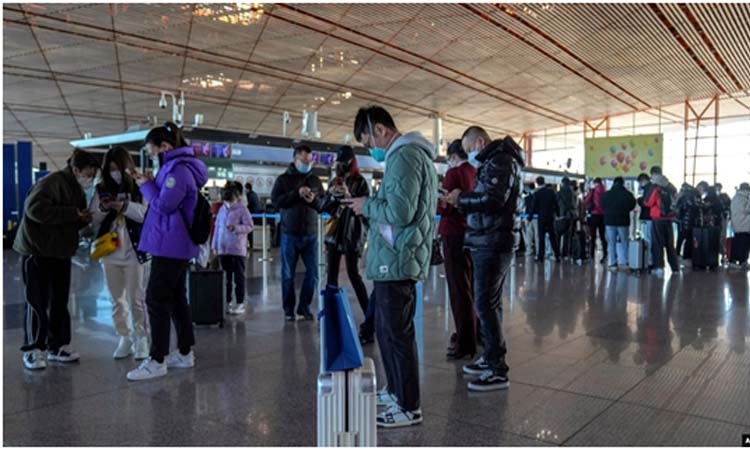Amid mounting international anxiety over the wave of COVID-19 cases sweeping China, North Korea has introduced a total ban on visitors from its close ally and neighbor.
“Chinese citizens are temporarily banned to enter,” reads an entry listed on China’s National Immigration Administration website. “All recent arrivals from the People’s Republic of China, including North Korean citizens, must undergo 30 days of quarantine and observation.”
It is not clear when North Korea imposed the measure or how long it will remain in effect. Several countries have announced new curbs on travelers from China since Beijing this week announced an end to mandatory quarantines for inbound travelers and allowing some Chinese to travel abroad, prompting a dramatic increase of interest in foreign travel by Chinese.
At the same time, the easing of lockdowns and other zero-COVID measures has been accompanied by a large increase in new cases in China, raising fears about the emergence of potentially more dangerous variants of the coronavirus that causes COVID. The North Korean ban on travel goes much further than the steps taken by other countries, most of which are simply requiring that passengers arriving from China provide evidence of a recent negative COVID test.
“Recently, in order to prevent and control pneumonia caused by the novel coronavirus, some countries and regions have adopted measures to control their borders,” says the announcement on the National Immigration Administration website. It says the agency “gathers relevant information and provides it to citizens who plan to go abroad.”
Other countries take steps:
The United States announced on Wednesday that beginning January 5, all travelers from China, with the exception of those under 2 years of age, must show negative COVID test results prior to boarding planes headed to the U.S.
Also on Wednesday, Italy, the country that was hit the earliest and the hardest among European countries in early 2020, issued a decree requiring mandatory COVID-19 antigen swabs and related virus sequencing for all passengers from China, including those in transit through Italy. Italy’s health minister, Orazio Schillaci, a trained nuclear medicine scientist, is quoted by Italian media as saying that his country is taking these “indispensable” measures “to ensure the surveillance and identification of any variants of the virus in order to protect the Italian population.”
On Tuesday, Japanese Prime Minister Fumio Kishida announced that as of midnight Friday, all air passengers from China as well as those who have been to China in the last seven days will be required to undergo COVID tests and that those testing positive will undergo seven days of quarantine “in principle.” Japan is also cutting down on flights from mainland China, Hong Kong and Macao to ensure quality testing of arriving passengers.
“Concern has been growing in Japan as it is difficult to grasp detailed situation” in China,” Kishida is quoted as saying by Kyodo News. Discrepancies in data released by China’s central government and local and provincial governments are another source of concern, Kyodo News reported. Striking a tone of balance, Kishida said that the temporary steps were aimed at avoiding “a rapid influx” of virus patients into Japan while adding, “We will be mindful of not stopping the international flow of people.”
Asked about the Japanese action, Chinese foreign ministry spokesperson Wang Wenbin said at a routine press conference this week that “China has always believed that all countries should adopt scientific, appropriate measures to prevent against the pandemic, and ensure that these measures do not affect normal exchanges among people.” The remark prompted one Chinese Twitter user to remark on the absence of any similar complaint about North Korea’s ban on Chinese visitors, prompting several thousand responses from readers.
“If the foreign ministry has such words for Japan for imposing a seven-day quarantine for those testing positive upon entry, doubtless China’s foreign ministry ought to issue a much sterner protestation against North Korea,” said a writer using the Twitter handle @GaoFalin.

